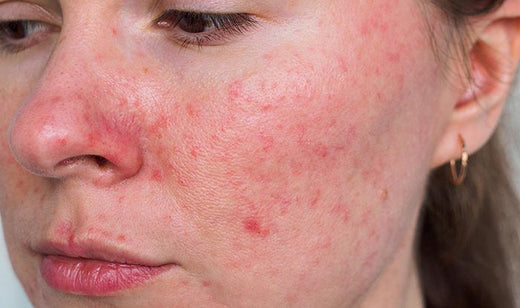Rosacea might just seem like occasional blushing at first, but it can be much more persistent and sometimes uncomfortable. It’s like having an uninvited guest on your face, and here, we’re going to learn how to kindly tell this guest to step back a bit.
What is Rosacea?
Think of your face as a canvas that sometimes decides to show its true colours in bright red. Rosacea is a skin condition characterised by redness on the forehead, cheeks, nose, and chin. It can also show up as small, red, pus-filled bumps. While it mainly affects the face, its impact can ripple out, touching aspects of personal and social life.
What Causes Rosacea?
Rosacea is a complex condition influenced by various factors. Understanding what triggers this skin condition can help in managing its symptoms more effectively.
Genetic Factors
Research suggests that genetics play a crucial role in rosacea. If your parents or siblings have rosacea, you might be more likely to develop it too. This genetic predisposition means that rosacea is not just about external triggers but also about what's encoded in your DNA.
Environmental Triggers
Environmental factors significantly impact rosacea. Here are a few key environmental triggers:
- Sun Exposure: UV rays can aggravate rosacea by damaging the skin barrier and causing inflammation.
- Hot and Cold Weather: Extreme temperatures cause blood vessels in the face to expand and contract, which can exacerbate redness and flushing.
- Wind and Humidity: Both can irritate the skin further, with wind stripping moisture and humidity causing excessive sweating, both of which can irritate sensitive skin.
Lifestyle Factors
Your lifestyle choices can also trigger rosacea flare-ups:
- Diet: Spicy foods, hot drinks, and alcohol are known to cause flushing and should be consumed moderately.
- Stress: High stress levels can increase cortisol, which worsens inflammation and can trigger a rosacea episode.
- Skincare Products: Harsh skincare products containing ingredients such as alcohol, menthol, or witch hazel can irritate the skin and exacerbate rosacea symptoms.
By recognising and modifying these triggers where possible, you can better manage your rosacea and reduce flare-ups, making a significant difference in your skin’s appearance and comfort.
Types of Rosacea
Rosacea has several types, each with its own set of challenges:
- Erythematotelangiectatic Rosacea: This type shows mainly as flushing and persistent redness.
- Papulopustular Rosacea: Looks like acne with its red bumps and pimples.
- Phymatous Rosacea: This involves thickening of the skin.
- Ocular Rosacea: It targets the eyes, making them irritated and red.
Skincare Ingredients to Avoid
When you have rosacea, certain ingredients commonly found in skincare products can actually exacerbate your symptoms. Here’s a closer look at what to avoid:
Benzoyl Peroxide
Commonly used in acne treatments, benzoyl peroxide is known for its robust antibacterial properties. However, for those with rosacea, this ingredient can be overly harsh, potentially leading to increased redness and irritation. It strips the skin of its natural oils, disrupting the skin barrier which is essential for those with sensitive skin conditions.
Alcohol
Alcohol in skincare products, especially denatured alcohol, acts as a drying agent. It can severely dehydrate the skin, making it more prone to irritation and redness. For someone with rosacea, maintaining skin hydration is crucial, and alcohol-based products are a definite no-no.
Witch Hazel

Witch hazel is often touted for its astringent properties, but these can be too harsh for rosacea-affected skin. It can cause an immediate reaction of redness and irritation upon application, leading to more pronounced symptoms.
Fragrance, Menthol, and Peppermint
Fragrance, whether synthetic or natural, can irritate sensitive skin. Menthol and peppermint, commonly used for their cooling effects, can similarly trigger flare-ups in rosacea-prone skin. These ingredients cause a tingling sensation that might feel refreshing to some but can lead to significant discomfort and worsening of rosacea symptoms for others.
By avoiding these ingredients, individuals with rosacea can help manage their condition more effectively, keeping their skin calm and as healthy as possible.
Managing Rosacea
Effectively managing rosacea involves a combination of skincare adjustments, lifestyle changes, and sometimes medical treatment. Here are key strategies to help control symptoms and improve the quality of life:
Skincare Routine
- Use gentle skincare products that are free from irritants such as alcohol, fragrance, and harsh chemicals.
- Opt for products that are suitable for sensitive skin and non-comedogenic to avoid clogging pores and triggering flare-ups.
- Always include a mild, moisturising cleanser and a soothing moisturiser in your daily routine.
- Add in non-irritating serums to penetrate deeper into the skin and deliver antioxidants in a gentle manner.

Daily Life and Coping
Rosacea can affect more than just your skin—it can impact your emotions and how you see yourself. Here’s how to handle it:
- Connect with Others: Support groups can offer tips and encouragement.
- Keep a Diary: This helps you track what triggers your rosacea, which can be incredibly useful.
Final Takeaways
Understanding rosacea is crucial for managing it effectively and maintaining a good quality of life. It involves both care in choosing skincare products and in lifestyle choices.
Rosacea might be a part of who you are, but it doesn’t define you. With careful management and a positive outlook, you can keep this uninvited guest under control and show the world your true, beautiful self.



